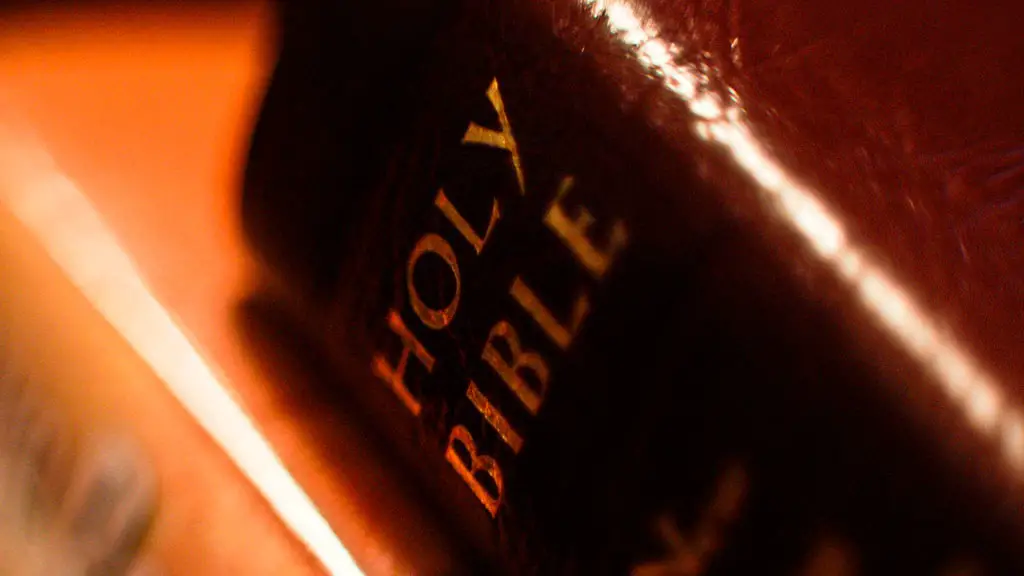Biblical Verses Referring To Homosexuality
The Bible does not directly refer to homosexuality, but there are several verses that allude to it. Leviticus 18:22 states “You must not have sexual relations with a man as one does with a woman; it is a detestable act.” Similarly, Leviticus 20:13 says, “If a man has sexual relations with another man, they have done a hateful sin; they must be put to death, their blood is upon them.” These verses are often used by religious groups to condemn homosexuality, as they seem to call it a sin worthy of death.
In the New Testament, Romans 1:26-27 states “Because of this, God gave them over to shameful passions. Even their women exchanged natural sexual relations for unnatural ones. In the same way, the men also abandoned natural relations with women and were inflamed with lust for one another. Men committed shameful acts with other men, and received in themselves the due penalty for their error.” Although it does not refer to it as homosexuality, it does condemns same-sex relations.
Interpretation Of Biblical Versus
Various theologians and scholars have interpreted these verses in different ways. Some argue that passages from the Bible that refer to homosexuality and same-sex relations are outdated, and thus no longer applicable in today’s society. Professor Lisa Redding, a professor of theology at the University of Southern California explains: “The ancient world had a very different way of thinking about same-gender sex than we do today; as a result, ancient authors such as the authors of the Bible spoke differently about such sex – but none of this implies that the same sex is immoral today.”
Other scholars believe that the biblical verses are still relevant today, and that they still condemn homosexuality and same-sex relations. John Piper, founder of Desiring God ministries states: “The Bible speaks with a clear voice that homosexual behavior is sinful regardless of the definition of marriage. The timeless truth of Scripture applies to all cultures and all times—yes, even ours today.”
Thought Of The LGBTQ Community Regarding Biblical Versus
The LGBTQ community has a different view on this topic. Many believe that the verses are outdated and no longer apply to today’s society. They argue that the Bible does not directly speak about homosexuality or same-sex relationships, and that due to changes in society, the interpretation of the Bible has changed too. Matthew Vines, author of The Gay Debate, argues “The Bible does not specifically address same-sex relationships between consenting adults. Our interpretation of the Bible must take into account the cultural context it was written in, as well as our current understanding of human sexuality.”
The LGBT also argue that the Bible also refers to other immoral acts, such as adultery, but does not make it a sin worthy of death. Therefore, they feel that homosexuality should not be treated any differently.
Examining The Anti-LGBTQ Laws In Detail
Although the Bible does not directly refer to homosexuality, there are several verses that refer to it in one way or another. These verses have led to the formation of anti-LGBTQ laws in many countries. For example, in India, Section 377 of the Penal Code criminalizes ‘carnal intercourse against the nature of the order of nature’. In Uganda, homosexuality is a criminal act. In some countries, such as Nigeria, homosexual behavior is punished by death.
There is a great debate as to whether these laws are in line with Biblical teachings. Some argue that they are a modern interpretation of Biblical verses, while others claim they are a form of discrimination and an unjustified restriction of freedom. Professor Richard Bullock, an ethics professor at Harvard University, claims “Despite some interpretations of Biblical verses, the truth is that no scripture or religious teaching can be understood in a vacuum, and it is ultimately up to lawmakers and citizens to decide whether the laws are just or unjust.”
Conclusion – Discussion vs. Legal Action
The discussion surrounding homosexuality in the Bible is often charged and heated. Religious scholars, theologians, and members of the LGBTQ community all have different interpretations and views on the matter. Some believe that the Bible still condemns homosexuality, while others believe that the verses are outdated and no longer applicable in today’s society. In the end, it is up to lawmakers and citizens to decide whether the laws regarding these issues are just.
Stockholm Syndrome and LGBTQ Suffering
The discussion regarding homosexuality in the Bible can not only be regarded as a moral issue, it is also linked to the psychological concept of Stockholm Syndrome. This phenomenon is characterized by an emotional affinity between captor and captive, typically triggered by violent, traumatic, or coercive circumstances and can influence people’s decisions. This can be seen in the LGBTQ community through the sufferance and discrimination of those who are forced to conform to or outright reject traditional religious teachings.
Linnea Nelson, a professor of psychology at the University of Monterrey, explains “For some in the LGBTQ community, police brutality, sexual assault, hate crimes, and other forms of discrimination can form an ‘inverted’ form of Stockholm Syndrome where the victim begins to identify with and even champion the values of the oppressor. As a result, internalized homophobia, religious shame, and self-hate can become a driving force behind why people do not come out or do not seek help.”
Relationship Between Homophobia and Religion
The interpretation of Biblical verses has led to a heightened atmosphere of homophobia, with many religious groups arguing that homosexuality is a sin. According to research by the Pew Forum on Religion & Public Life, more than half of religiously affiliated adults in the U.S., say that society should not recognize same-sex marriage. While most non-affiliated people in the U.S. support same-sex marriage, the majority of white evangelicals, black Protestants, and Jehovah’s Witnesses oppose it.
But there are those who believe that religion should not be used to create laws or stigma against the LGBTQ community. Dr. Sanjay Chand, an expert on religion and sexuality, argues “When it comes to same-sex relationships and homosexuality, the Bible does not provide a clear answer, and so it should not be used in this context. Instead, what we should do is look to the moral teachings of the Bible and use those as our North Star when making reasoned decisions about how to treat LGBTQ people.”
Religious Texts Other Than The Bible
While the Bible is often the most cited religious text towards those of the LGBTQ community, it is not the only holy book to discuss sexuality. The Quran, the central religious text of Islam, also speaks has verses that speak of same-sex relationships. These verses speak of homosexuality and same-sex relations in a negative light, but they do not call it a sin worthy of death. According to Islamic scholars, these verses must be understood in light of the moral and ethical context of the time and interpreted as a warning against excess.
The Hindu religion also speaks of same-sex relationships in their sacred texts. In the Mahabharata, a story about two warriors who share a same-sex relationship is recounted, but it does not condemn the act or cast judgement. Instead, it speaks of their love story and the intense emotions that are shared.
LGBTQ Representation In The Media
The discussion regarding LGBT+ rights has been amplified in recent years due to an increased number of positive depictions in mainstream media and other public domains. Movies such as Love, Simon, Moonlight, and The Imitation Game, which feature LGBT+ characters, have been warmthly recieved by both critics and audiences. This has helped to move the conversation forward and create a more inclusive society.
It is also important for the LGBTQ community to be represented in the media. Tyler Oakley, an LGBT YouTuber, explains “When people in the LGBT+ community see themselves on screen, it can lead to greater self-acceptance and a sense of belonging. This is why it is important that we make sure to represent the LGBT+ community in all kinds of media.”
Role Of Religion In Inclusivity
Despite the progress made in recent years, there are still many people in the religious community who oppose LGBT rights based on their interpretation of the bible. This has created a divide between those who are accepting of the LGBTQ community and those who are not. It is important to remember that religion and inclusivity are not mutually exclusive concepts, and that people of faith are capable of acceptance and understanding.
Kimberly Davis, a pastor in the United Church of Christ, states “It is important for churches to create an open and affirming atmosphere for all people, regardless of their sexual orientation or gender identity. We must also create safe spaces for dialogue and understanding, free from discrimination and judgement. Only then can we open the door for real and meaningful change.”




